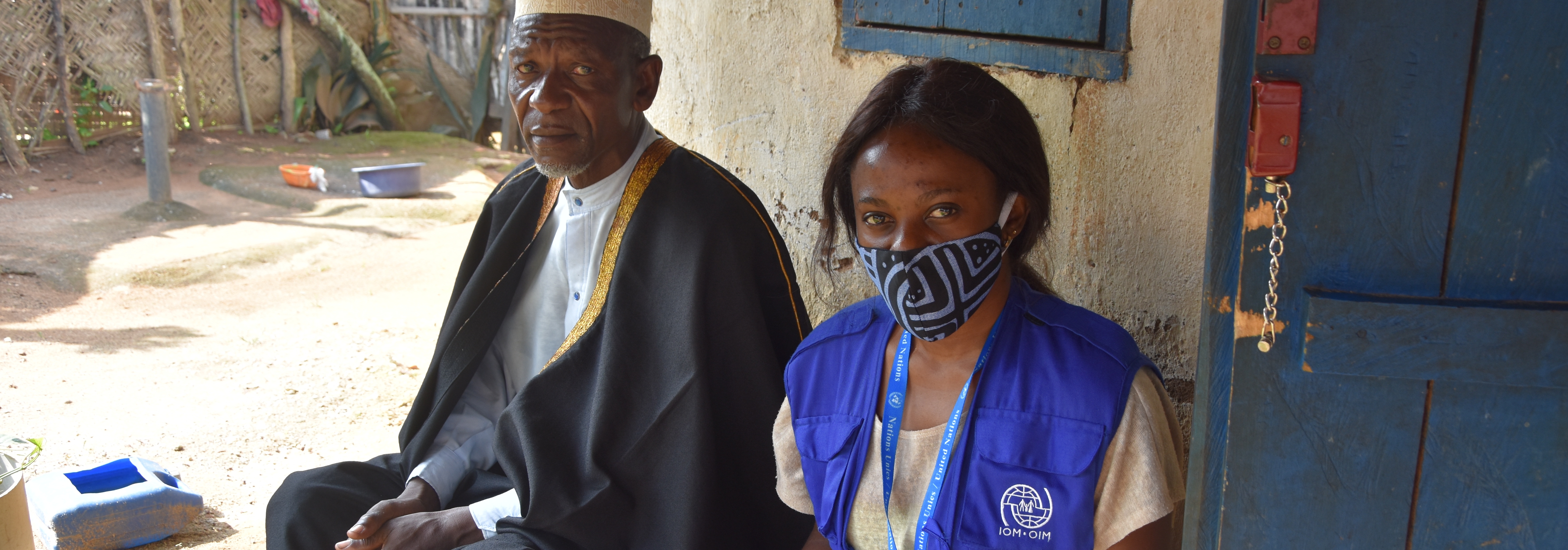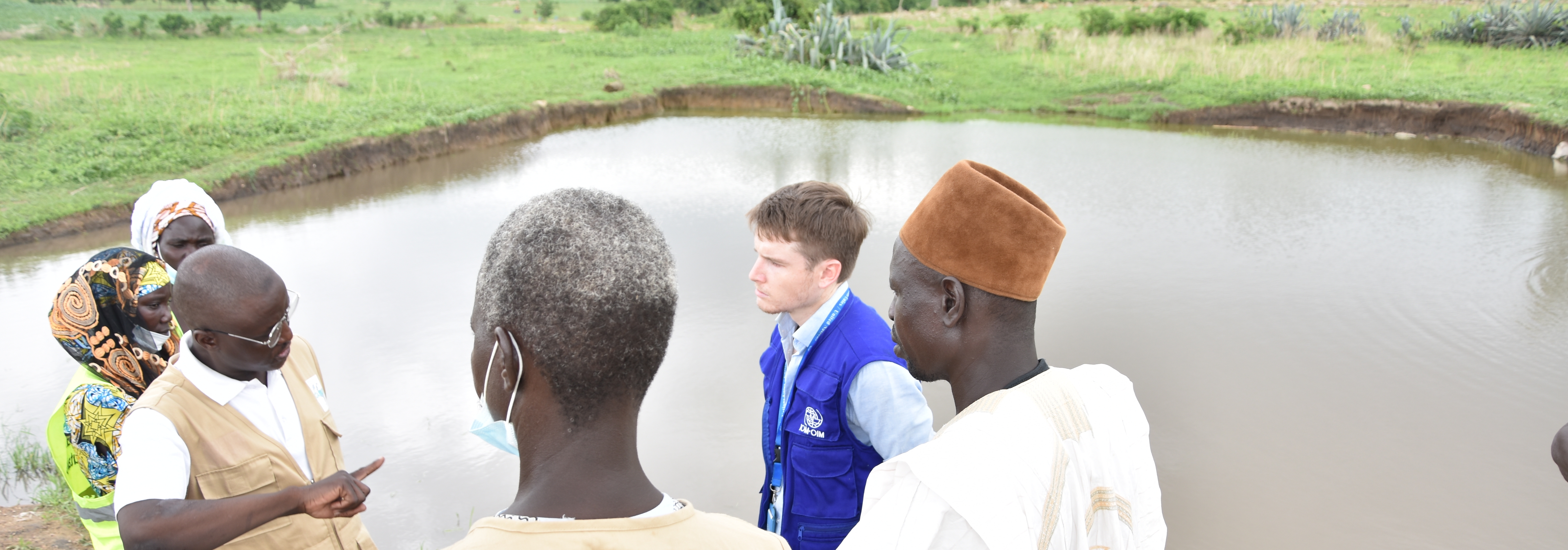IOM Vision
IOM Cameroon embraces the humanitarian-development-peace nexus vision in its strategic approach for two key pillars of the mission’s interventions: emergency response to crisis and peacebuilding and recovery. To this end, IOM Cameroon provides tailored lifesaving assistance and protection, complemented by efforts to build community-based approaches for the attainment of durable solutions, seeking to prevent forced displacement and favour reintegration by addressing the drivers of crises, supporting mechanisms of conflict management and reduction, and building resilience in communities. IOM Cameroon applies integrated approaches that respect humanitarian principles and support transition and recovery efforts and sustainable development. The varied nature of the ongoing crises in Cameroon, from the Lake Chad Basin’s Far-North region, to the North-West, South-West (NW-SW) Anglophone regions, to the East region’s refugee crisis, requires IOM to adapt response strategies to these specific contexts, strengthening resilience and ensuring no one is left behind.
Objective
Saving lives and protecting people on the move
IDPs, vulnerable host communities and IDP returnees in North-West, South-West and Far North regions, with key vulnerabilities including low access to protection, life-saving assistance and basic services.
|
IOM plans to provide tailored shelter/NFI assistance to the most vulnerable IDPs identified through vulnerability assessments (based on national cluster guidelines and including persons with special needs, single female-headed households, elderly, etc.) in the North-West, South-West and Far-North throughout 2021-2022, to increase the overall capacity of the cluster to address urgent needs and alleviate suffering. Interventions will be in line with the Shelter/NFI cluster guidelines, with intervention modalities (e.g. in-kind distributions, cash-based interventions, among others), populations targeted (e.g. IDPs in sites, collective centres, in host communities) depending on the local context and vulnerability criteria. Initiatives will include:
|
|
Following IOM’s Manual on Community-Based Mental Health and Psychosocial Support in Emergencies and Displacement, the Organization will target conflict-affected populations in the North-West, South-West as well as the Far-North region of Cameroon with a range of needs, including victims of gender-based violence (GBV). Initiatives will include:
|

Objective
Driving solutions to displacement
IDPs, vulnerable host communities and IDP returnees in both North-West, South-West and Far North regions, with key vulnerabilities including low access to protection, livelihoods and basic services including education and healthcare. All stakeholders of the Humanitarian-Development-Peace Nexus Task Force for additional contextual knowledge for targeted high-quality programming.
|
IOM will continue its active participation in the Humanitarian-Development-Peace Nexus Task Force, set-up in Cameroon in August 2019, to unite key stakeholders including UN agencies and governmental counterparts that are working on the development and implementation of durable solutions for displacement affected populations. Once the Task Force finalizes its durable solutions strategy, IOM plans to:
|
|
IOM's community stabilization initiatives are dedicated to addressing the root causes of conflict and instability, always from a community based approach that guarantees local buy-in and ownership. Activities planned include:
|
|
Continuing from its technical support to the government in the framework of the COVID-19 pandemic, IOM plans in 2021-2022 to continue using its specialised health capacity to strengthen public health preparedness in preparation for future health crises in Cameroon, in partnership with WHO. Initiatives will include:
|
|
IOM will continue to participate in the Task Force working on the socio-economic impact of the COVID-19 pandemic, continuing with work towards alleviating the health crisis with synergies and partnerships with other agencies. With a sharp contraction in planned remittances a a result of the COVID-19 pandemic, IOM seeks to respond to the negative gender and socio-economic impacts of COVID-19 on remittance flows through short-term and long-term interventions for sustainable development, including engagement with the government and service providers to reduce remittances transaction costs, in line with SDG 10.c.1. Interventions will include:
|
Building on its engagement in the Far North region of Cameroon, IOM:
- Continues its support to the Government of Cameroon to collaborate with national and local partners to support the peacebuilding and social cohesion efforts in conflict-affected communities where displacement and returns may impact the fragile social fabric and increase the risk of inter-communal conflict.
Objective
Strengthen preparedness and reduce disaster risk
|
Multiple stakeholders across the multi-disciplinary spectrum in disaster risk reduction and climate change adaptation, including the Government of Cameroon, UN Country Team, Resident Coordinator’s Office, international and local NGOs, who would benefit from additional information and coordination on risk information systems, enhanced preparedness plans that will also present a greater value for money in case of eventual response. Actors involved in COVID-19 response at Points of Entry will also be targeted. |
|
IOM will continue its efforts to reinforce capacities at all coordination levels for disaster risk reduction and emergency preparedness, acknowledging that preparedness activities save time and costs in potential humanitarian responses. IOM will engage government counterparts, UN Country Team members including UNDP, NGO partners and multi-disciplinary experts in the coordination of preparedness measures, to work together to prepare for the potential impacts of natural hazards. In particular, IOM will:
|
|
In line with the Sendai Framework priorities and in collaboration with the Capacity for Disaster Risk Reduction Partnership (CADRI), IOM Cameroon works with multiple stakeholders, including governmental counterparts, the Resident Coordinator and multi-disciplinary experts in disaster risk reduction (DRR) and climate change adaptation to strengthen the country's risk information systems, prioritise risk reduction in national and local plans and enhance preparedness systems. Activities and measures will be designed to mitigate existing and prevent new disaster risks. In collaboration with CADRI, the following initiatives will be prioritized in Cameroon this year:
|
|
Continuing IOM’s co-lead role with the government for the Points of Entry (PoEs) working group for COVID-19 preparedness and response in Cameroon, and leveraging existing partnerships over previous PoE work with local authorities, WHO, and the National Observatory for Public Health, IOM plans to continue:
|
|
IOM plans to strengthen systems for MHPSS in crisis contexts, ensuring that systems are well prepared for sudden shocks. Initiatives will include:
|
Objective
Contribute to an evidence-based and efficient crisis response system
|
50 partner humanitarian and recovery organisations that would benefit greatly from the continued production and dissemination of reliable data on displacement figures and trends for a more informed and appropriate crisis response. All displaced populations in the North-West, South-West and Far-North who will benefit indirectly from a more efficient humanitarian response overall. Data collection on migration trends since the COVID-19 outbreak will enable adapted programming towards vulnerable displaced populations and will also benefit border workers at Cameroon’s PoEs that are at higher risk of exposure to COVID-19. |
|
As in previous years, IOM aims to continue providing a better understanding of population movements and the evolving needs of conflict-affected populations in the Far-North, South-West and North-West regions of Cameroon through the regular collection, processing and dissemination of data on displacement events and trends. IOM will further engage with governmental counterparts to ensure capacity transfer and appropriation on specific data collection activities conducted for several years in the Far North region. A range of information products will be distributed throughout 2021-2022 depending on partners’ needs:
All of these activities will contribute to a general improvement in the quality of partners’ programming and targeting with more informed and appropriate crisis response based on accurate and up to date information made available. They will also strengthen efforts for an IOM sub-regional strategy of harmonization of methodologies, calendars and products across the Lack Chad Basin countries. These activities will support the creation of a sub-regional DTM able to provide better cross-country analyses information to national and sub-regional authorities (LCBC). IOM will also engage with information management (IM) stakeholders to ensure DTM primary and secondary data is properly shared and used. In the wake of the GIMAC-DEEP initiative, IOM will provide the expert panel with relevant information and advocate for common data sharing between UN agencies and with partners working on information management and statistics in Cameroon (Information Management Working Group, National Institute for Statistics, etc.). |
Cameroon
The map used here is for illustration purposes only. Names and boundaries do not imply official endorsement or acceptance by IOM.
Figures are as of 31 December 2023. For more details of IOM's operational capacity in country, please see the IOM Capacity section.















